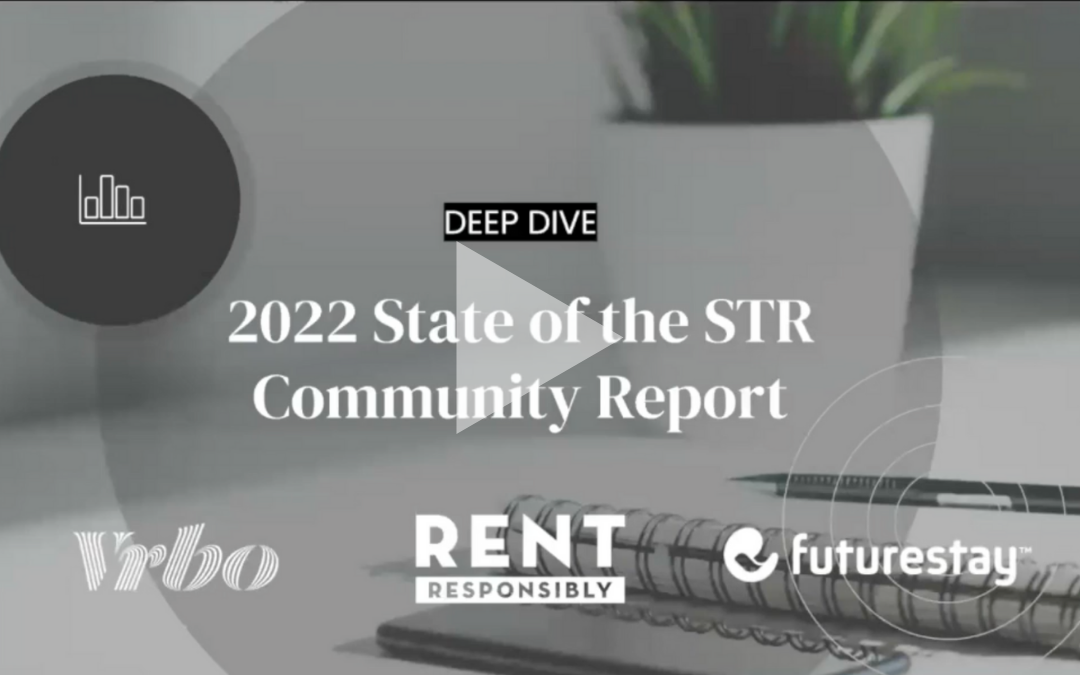Thank you to those who tuned in for our deep-dive webinar on the first-ever State of the Short-Term Rental Community Report. The study was conducted by the College of Charleston and funded by Rent Responsibly and partner companies Vrbo and Futurestay, among others.
The purpose of the study was to:
- Quantify the positive economic and employment impacts short-term rentals (STRs) have on their communities
- Distill challenges operators face in complying with local regulations
- Uncover solutions for effective municipal STR management
The study contained two parts. In Phase 1, researchers with the College of Charleston’s Riley Center for Livable Communities interviewed 27 municipal staff and tourism executives on the challenges they face in regulating STRs in their communities.
During Phase 2, researchers conducted a survey of STR operators in all 50 states and analyzed the answers from 3,870 respondents, including owners, owners who also manage STRs for others, and property managers. Below are some of the key takeaways from the study.
Highlights & Takeaways
- Government staff want to work with the STR community, seek collaboration and compliance with owners and managers, and need help with enforcement.
- They do not have full control of the policies related to housing, taxation, real estate, and especially STRs in their communities. Those powers are spread across the city, the county, the state, and down to the district and neighborhood HOA level.
- They understand that solutions come from conversations and engagement at the local business, community, and government level.
The top three challenges in government enforcement of STR rules:
- Return on investment or time. Investigating a nuisance or ordinance violation and bringing resolution in a timely manner is the most time-consuming part of managing STRs.
- How to get noncompliant operators into compliance
- Nuisance complaints
Short-term rental owners and managers can help reduce these government challenges by:
- Engaging with municipal officials, such as giving information or feedback
- Participating in the policymaking process (serving on a task force, giving public comment, providing information to City Council)
- Helping squash noncompliance by other STR operators
- Working to create a fair operating environment for businesses, community, and government
Why should STR operators help enforce local regulations?
“Think about it … like drunk driving. You might be a perfectly responsible driver and follow all of the traffic laws, but if you see someone flying down the road driving drunk, it might not be your fault or responsibility that that person is driving drunk, but you do have a social duty to call the police and get that person off the road before they harm themselves or somebody else.”
Alexa Nota, co-founder and COO of Rent Responsibly
Watch: The Untapped ROI of Community Partnerships
Short-term rental operations are mostly small businesses
- The survey results indicate that the STR industry is majority small businesses, entrepreneurs, and hobbyist hosts, and 58% of STR operators are women.
- Of the 3,870 survey respondents, 84.2% were owners, 8.9% were owners who also managed others’ STRs, and 6.9% were property managers.
- Of STR owners, 68% owned just one STR, 25% owned three or fewer, 5% owned five to six, and just 3% owned seven-plus.
- Half of STR owners managed everything themselves. Of those owners who do not manage everything themselves, 31.7% hired a property manager, and 68.3% hired contractors or employees.
- Of property managers who own no STRs, 54% managed 10 STRs or fewer, and 77% managed 50 or fewer.
Reservation Statistics
- About 31% of operators rented for both short- and mid-term stays (In the study, mid-term stays were defined as 30 days to five months).
- Only 15% of owners have their own website.
Good Neighbor Practices
- In the study, good neighbor practices were defined as measures that reduce noise, prevent noise issues, control parking, and manage trash disposal.
- Of those respondents with good neighbor practices, 80% of them said they had positive relationships with all or most of their neighbors. For those without good neighbor practices, just 62% said they good relationships with their neighbors.
- Those operators with a local agent or responsible contact to promptly respond to issues at their STR more often reported good neighbor relationships and had fewer complaints.
Conclusions from the survey
- A good policy needs good enforcement.
- Cities must better educate constituents on how/where to report complaints.
- When asked whether their local government has a good program for maintaining compliance and a method for reporting operators who are out of compliance, such as a hotline, most respondents answered, I don’t know.
“If we, as the professional short-term operator community don’t know this information, how can we expect our neighbors, how can we expect our community members to? And if they don’t know that, where are they going to go to complain? I will tell you, it’s City Council. When that happens, that puts short-term rental communities on a fast track to what can often be overregulation or overreaching rules that actually aren’t all that effective for the community.”
Alexa Nota, co-founder and COO of Rent Responsibly
- Operators have an opportunity to self-manage STRs at the community level, including compliance and nuisance mitigation, and set the standard for responsible, professional operation.
Tips on how this data can inform STR advocacy
- Form relationships with your elected officials and government staff. Sharing your perspective directly with local officials and their staff is one of the strongest and easiest ways to advocate for short-term rentals.
- Implement good neighbor policies. Your elected officials want to know what you’re doing to responsibly manage your short-term rental and mitigate any community concerns.
- Join or create a local alliance. Take a leadership position. Help educate alliance members about compliance, hospitality, and good neighbor practices.
- Engage with the media and the community. For instance, you could join your local chamber of commerce. Spend time talking to your neighbors and members of your community, explaining what you do and the value vacation rentals bring to your neighborhood, city, and state.
- Reach out for free assistance and resources. Online platforms such as Vrbo offer STR alliances help with advocacy.
“The role we play is as a teammate toward advocating, promoting, and hopefully passing fair and effective policies for our industry that set us all up for long-term success. Reach out … bring us to the table; we’re on the same team.”
Philip Minardi, director of public affairs, Expedia Group
Watch: Leader Seminar: Data-Driven Storytelling for Effective Advocacy ▶️
What this means for your hosting business
- Professionalism still counts regardless of size and experience level.
- Having the right mix of your own direct booking site and multi-channel distribution helps reach more responsible and desirable guests.
- Software, like the Futurestay Operating System, can help automate tasks, save time, organize bookings, grow business, and deliver a higher quality hospitality experience.
- Start your own direct booking website. It allows you to build your brand while communicating compliance and guest rules and highlighting the best of the local community.
“When only 15% of owners have direct booking websites, having a site can help you stand out from a crowded market and build trust and loyalty with your guests.”
Monique Kandou, head of partnerships at Futurestay
- Start to build a strategy for how to grow and streamline your business.
- Ensuring that you’re putting your best foot forward when you’re putting your business and brand out there. That comes back to professionalizing.
•••
SUBSCRIBE TO GET UPDATES



